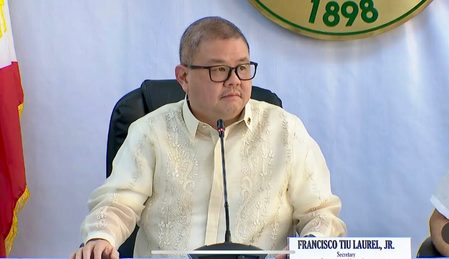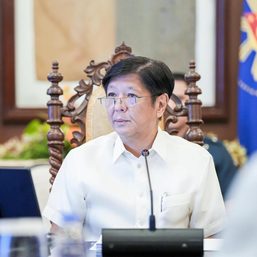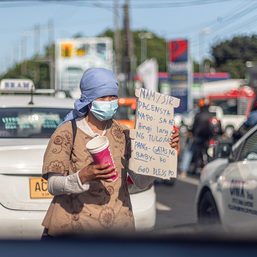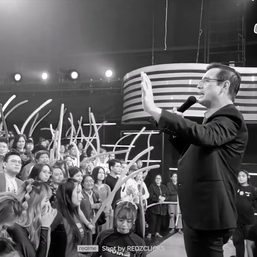SUMMARY
This is AI generated summarization, which may have errors. For context, always refer to the full article.
![[ANALYSIS] Candidate A or candidate B? How to (not) make data-driven choices](https://www.rappler.com/tachyon/2023/11/TL-winnie-monsod-DA-sec-November-17-2023.jpg)
Reader, let’s do a mental exercise. Put yourself in place of a head-hunter, or a Human Resource expert, or, let’s be honest, President Ferdinand Marcos Jr. You are tasked with looking for the most qualified person to head the Department of Agriculture (the DA), which oversees the agriculture, fisheries and forestry (AFF) sector of the economy.
How important is AFF in the economy? Well, latest data from the Philippine Statistics Authority (PSA) show that it accounts for about 8.5 to 9.0% of total output (GDP), with fisheries accounting for 1.3 percentage points. It accounts for 20% of total employment (4 percentage points of which are fisherfolk). Moreover, farmers and fisherfolk are among the poorest basic sectors, with poverty incidence of 30 and 30.6% respectively (compared to a national poverty incidence of 18.1%). In 2021, there were 348,000 poor fisherfolk, and 2.4 million farmers. Finally, a World Bank study finds that agricultural growth has special powers in reducing poverty: GDP growth originating in agriculture is at least twice as effective in reducing poverty as GDP growth originating outside agriculture
So, it is very important, right? But to continue: You have narrowed the candidates down to two, with the following respective Curricula Vitae. These CVs are not as complete as one would like them to be, having been obtained from googling the candidates and from news reports, rather than having the candidates submit their own. But the data given should be sufficient to make a judgment.

* University of Santo Tomas (UST) Assistant Registrar Kashmer Cruz was quoted was saying that there is no record of candidate A’s graduating with a computer science degree from the university. Nor did the Office of the Registrar and the accounting department find any record of enrollment in the university of the name of candidate A.
Candidate A received training in refrigeration, net manufacturing, engine overhauling, electronics, hydraulics, food manufacturing, shipbuilding, and ship repair. But there is no indication of where the training took place, or how long the training periods were.




Who would you choose, Reader?
It is a no brainer. The CVs show that Candidate B is an internationally and nationally recognized agriculture expert – with specialization in rice, and climate change, and with great administrative and management work experience. And that is who is needed at the helm of the Department of Agriculture. The award he received from the Vietnamese government was in recognition of the fact that he had helped them, through climate-smart mapping, avoid an El Niño disaster that befell them in 2016 and which had caused the production loss through salinization of more than one million tons of rice.
And yet, President Marcos Jr. chose Candidate A, whose expertise, if any, is limited to commercial fisheries while most of our fisherfolk are municipal or artisanal fishermen. Nothing in his CV suggests anything more.
But the point is: What does the President’s choice say about the way he makes his decisions? How does he rationalize this choice? And his other, equally unfortunate choices? What does this portend for the Philippines? Let’s think on that. – Rappler.com
Solita “Winnie” Monsod was the first National Economic and Development Authority secretary appointed after the fall of the Marcos dictatorship in 1986. She is a professor emerita at the UP School of Economics where she taught starting 1983. She finished her degree in economics in UP and obtained her masters in economics at the University of Pennsylvania. She is a board director of Rappler Inc.
ALSO ON RAPPLER
1 comment
How does this make you feel?










![[WATCH] #TheLeaderIWant: Filipino voters sound off on community issues a year before 2025 elections](https://www.rappler.com/tachyon/2024/05/filipino-voters-sound-off-on-community-issues-1.jpg?resize=257%2C257&crop=276px%2C0px%2C720px%2C720px)



![[Just Saying] SONA 2024: Some disturbing points](https://www.rappler.com/tachyon/2024/07/TL-marcos-sona-points-july-23-2024.jpg?resize=257%2C257&crop=335px%2C0px%2C720px%2C720px)










Thanks to Prof. Winnie Monsod for her enlightening and educational article entitled, “Candidate A or Candidate B? How to (not) make data-driven choices.” As asked by Prof. Monsod: “Who would you choose, Reader?” Of course, candidate B! And if Prof. Monsod would allow me to answer her last questions: 1) What does the President’s choice say about the way he makes his decisions? Answer: It is based on Political Patronage. 2) How does he rationalize this choice? Answer: Friendship and campaign fund donation. 3) Other equally unfortunate choices? Answer: Based on Political Dynasty and Patronage. 4) What does this portend to the Philippines? Answer: Agricultural sector development will retrogress even more which will indirectly contribute to the persistence of the 54-year-old Philippine Communist Insurgency.